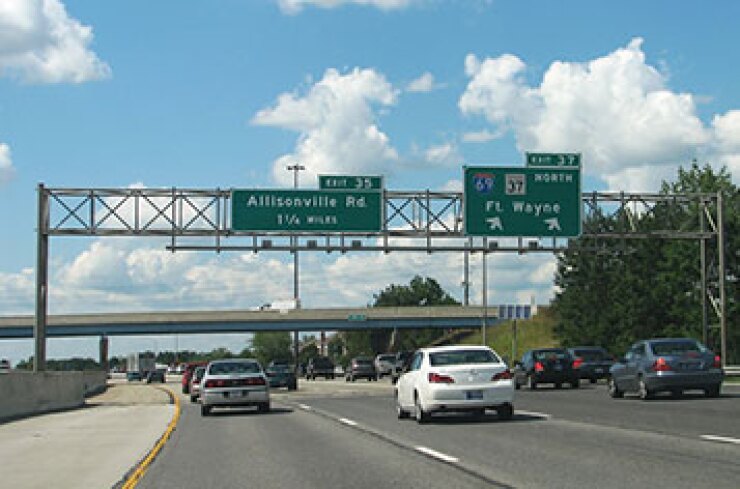
DALLAS -- Indiana would ask the Transportation Department for permission to toll its 1,350 miles of interstate highways to ensure that road users pay for the upkeep, under a transportation funding measure adopted by the state House.
House Bill 1002, which passed by a 61-36 margin on Thursday with none of the chamber's Democrats in favor and seven Republicans also voting no, would give the governor sole authority to levy interstate tolls with no need for approval from the Legislature if the federal government signs off on the waiver.
Thought the law creating the interstate highway system in the 1950s banned tolling of the roads, later legislation allowed a pilot program of interstate tolling limited to three states. So far, none of the three—Virginia, Missouri, and North Carolina—have done so.
The Indiana legislation, which would provide $1.2 billion per year of new road revenue, would raise the state gasoline and diesel taxes by 10 cents per gallon. The bill would also raise annual vehicle registration fees by $15 per year and adds a $150 per year fee for electric vehicles. The fuel taxes would be linked to inflation, with increases of up to 1 cent per gallon per year through 2024.
The road funding plan is based on user fees, said House Speaker Brian Bosma, a Republican from Indianapolis.
"Those that use the asset more, pay more. Those who use the asset less, pay less," Bosma said.
The tax and fee increases will cost the average Indiana motorist a total of $63 per year, he said.
Indiana DOT said last year that it needs $1.2 billion per year for the next 20 years to reach its goal of having 95% of highway pavement and 98% of state highway bridges in fair condition or better.
Rep. Ed Soliday, the author of the bill and chairman of the state House Transportation Committee, said those goals cannot be attained without tolling or some other significant revenue stream.
"If you take anything out of the package, then you've got to put something in, or you've got to lower expectations," said Soliday, a Republican from Valparaiso. "We should deliver a safe and efficient, well-maintained infrastructure for our kids and our grandchildren with minimum debt being handed to them."
The state's gasoline tax revenues will begin a steady decline in 2021 due to inflation and the increasing efficiency of modern vehicles, Soliday said.
"We have this huge hole starting in 2021," Soliday said. "The issue is how do you plug the hole if you can't do it with a reasonable amount of gasoline tax? Tolling is clearly how we're filling that gap starting in the 2021 era in the plan."
A higher gas tax would be the most equitable way to fund roads, said Rep. Thomas Washburne, a Republican from Inglefield.
"While it is labeled a tax, it is closer to a user fee," he said. "I think it's unfair to raise people's property taxes or raise their income taxes to handle the roads."
Putting tolls on existing highways is a non-starter for the state's truckers, said Gary Langston, president of the Indiana Motor Truck Association.
The shape of Indiana's highways is a concern, but his members support an increase in fuel taxes rather than tolls to fix the funding problem, he said.
"We have to do everything we can to be able to move freely and move commerce," he said. "Congestion is a major issue for us. It's really expensive to be sitting and not able to move."
Gov. Eric Holcomb supported the road plan in his first State of the State address in January.
"The fact is, existing sources of revenue are just not keeping up," Holcomb said.





